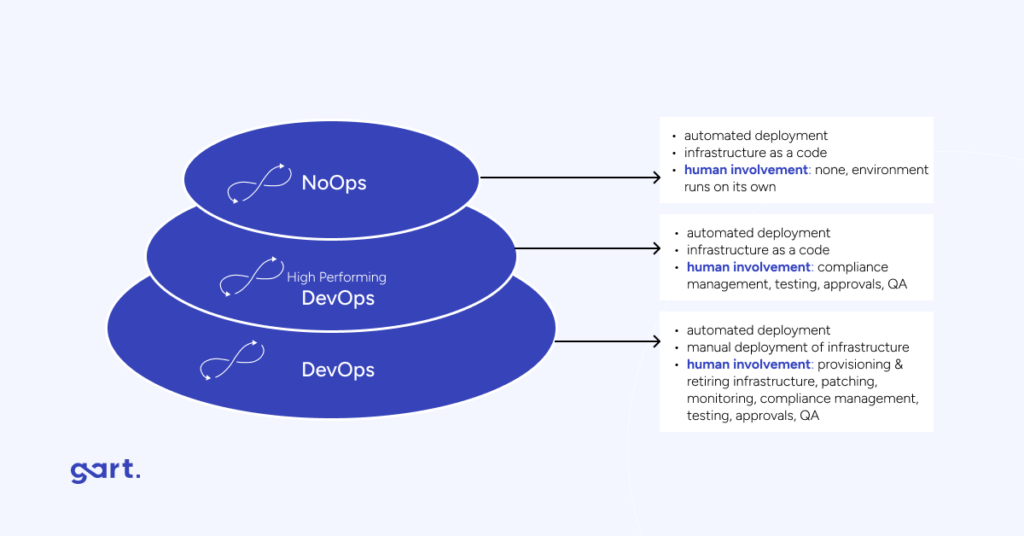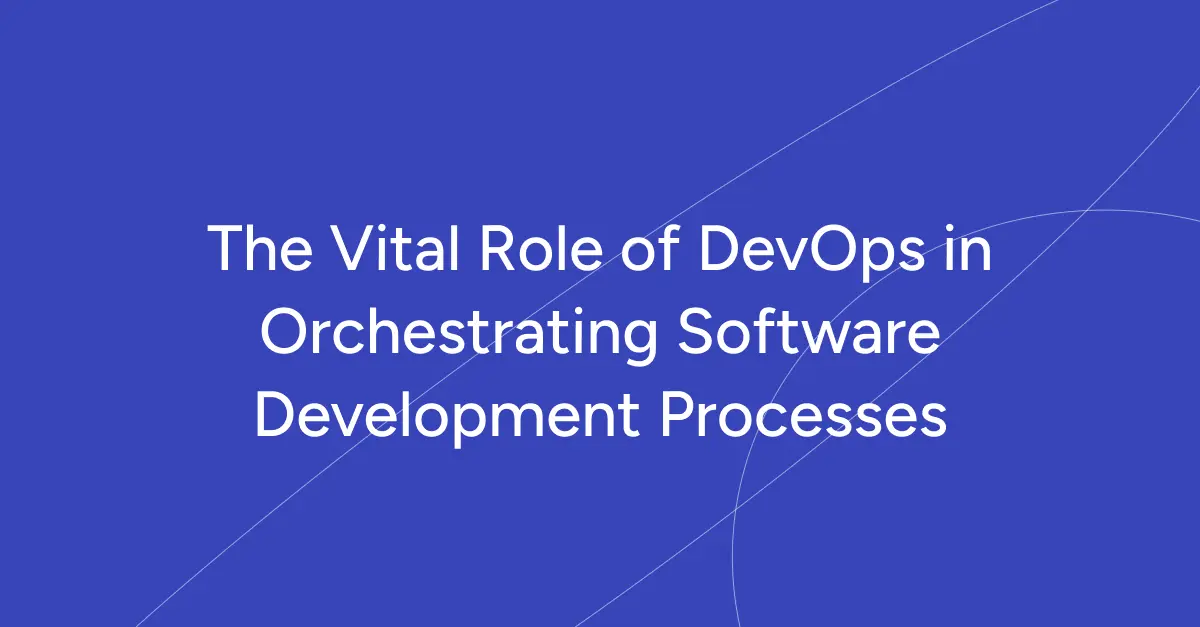Can the NoOps concept eliminate the need for DevOps engineers entirely in software development? It’s quite possible that NoOps will empower developers to handle all aspects of delivering a software product independently. However, let’s delve deeper into this somewhat controversial topic.
What is NoOps?
NoOps is a way of developing and deploying software where the need for specialized operations (Ops) teams and their tasks is minimized or entirely eliminated. The term “NoOps” comes from the DevOps culture, which emphasizes collaboration and communication between ops engineers and developers to optimize and automate the Software Development Life Cycle (SDLC).
In the NoOps approach, developers take on many tasks typically handled by DevOps teams, such as deploying and monitoring programs, managing infrastructure, and ensuring the reliability and security of the system. Two key drivers of NoOps are the increasing automation of IT and the widespread use of cloud computing. NoOps environments rely on automated, policy-based processes, often implemented through initiatives like DataOps, AIOps, and DevSecOps.
The main idea behind NoOps is to automate as many processes as possible (provided it’s cost-effective), reduce the need for manual intervention, and minimize the risk of human error.
Among the advantages of the NoOps approach are:
- Project Implementation Speed: Projects can be implemented more quickly.
- Ease of Development Management: Development management becomes more straightforward.
- Optimized Development Costs: Development costs are optimized due to a reduced workforce.
- Business Scalability Simplicity: Scaling the business becomes simpler.
Can We Do Without DevOps Specialists Now?
It might seem like NoOps implies that operational teams are no longer necessary. However, it’s essential to note that this approach still requires expertise in areas such as infrastructure design, cybersecurity, and compliance.
Rather than eliminating operational teams, NoOps aims to make them more efficient, freeing up time to address high-level tasks and strategic issues.
As a result, this approach demands developers to have more experience in areas like infrastructure, networks, deployment, monitoring, and more—at least, that’s how it appears at first glance.
However, the evolution of software development has always been accompanied by a need or desire to simplify certain things, tools, and processes. So, how does it happen that developers now seem to have more on their plate?
In practice, the NoOps approach doesn’t mean developers take on all the functions typically handled by DevOps/SRE. Instead, the DevOps team establishes a foundation, documents it, and provides it to software developers. This involves implementing practices and tools that “isolate” the development team from the infrastructure layer and ensure its support.

Is NoOps a Panacea?
Unfortunately, no, so DevOps is very much alive and thriving. One might wonder, why not skip DevOps and go straight to NoOps with all its advantages? Well, to begin with, NoOps is confined to applications that fit into existing PaaS solutions. Many companies still use monolithic legacy applications that require significant updates or complete rewriting to function in a PaaS environment.
Additionally, new technologies will emerge that may not have suitable NoOps solutions.
Examples of NoOps Platforms
In reality, the NoOps concept is not entirely new. Most of us have already heard of or even had the opportunity to use similar services and platforms.
One example of a PaaS (Platform as a Service) solution is Heroku. Using this platform, anyone can deploy their software in the cloud with just a few clicks, and for a small application, it can even be free.
Another example is DigitalOcean App Platform, a managed PaaS that simplifies the deployment and scaling of applications. Developers can upload their code to the platform, and DigitalOcean takes care of creating the necessary infrastructure, managing containerized deployments, as well as scaling and load balancing.
Google App Engine is a fully managed serverless platform for developing and hosting web applications. It automatically scales your application based on traffic and consumed resources.
DevOps vs. NoOps
| Feature | NoOps | DevOps |
|---|---|---|
| Definition | Minimizes or eliminates operational tasks, aiming for fully automated processes. | Emphasizes collaboration between development and operations teams to streamline the software development lifecycle. |
| Responsibilities | Developers take on many operational tasks, reducing the need for a dedicated operations team. | Operations and development teams collaborate to address both development and operational aspects. |
| Expertise Required | Developers need more expertise in infrastructure, networking, deployment, and monitoring. | DevOps engineers possess a blend of development and operations expertise. |
| Platform Examples | DigitalOcean App Platform, Google App Engine. | Kubernetes, Docker, Jenkins, Ansible. |
| Scope | Primarily suited for applications that fit into existing PaaS solutions. | Applicable to a wide range of applications, including monolithic legacy systems. |
| Flexibility | May not be suitable for all types of applications, particularly those requiring specific infrastructure configurations. | Offers flexibility to adapt to diverse application architectures and infrastructure needs. |
| Evolution | Seen as an evolution of DevOps, focusing on increased automation and reduced operational overhead. | Represents the collaboration and synergy between development and operations, evolving to meet changing software development needs. |
| Development Focus | Developers concentrate on the code, with less involvement in operational tasks. | Developers work collaboratively across the entire software development lifecycle, addressing both development and operational concerns. |
| Complexity | Developing NoOps platforms can be complex, requiring architectural decisions and solving intricate challenges. | Involves creating a seamless integration of development and operational processes, managing complex toolchains. |
| Overall Goal | Aims to streamline and automate processes to reduce friction and increase developer focus on code. | Strives for collaboration and efficiency to achieve faster, more reliable software delivery. |
Conclusion
The NoOps approach should not be seen as a disruptor to DevOps; rather, it can be viewed as the next framework, a kind of evolution of DevOps or SRE. On the other hand, it will require engineers to acquire knowledge in areas that were not traditionally part of their expertise, while DevOps engineers will have the opportunity to focus more on their core responsibilities. Developing a NoOps platform itself is a complex task, requiring the adoption of many architectural decisions and the resolution of intricate challenges.
The real goal of DevOps is acceleration, cost reduction, and improved quality. NoOps, with its elimination of friction between developers and IT administrators, contributes to further automation and allows developers to concentrate directly on the code.
In essence, both NoOps and DevOps serve the overarching objective of enhancing efficiency and collaboration within the software development lifecycle, each offering its unique approach to achieving these goals.









